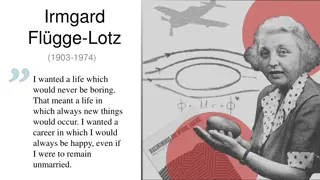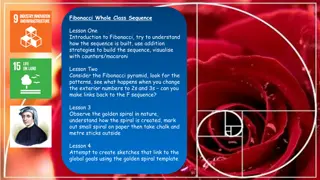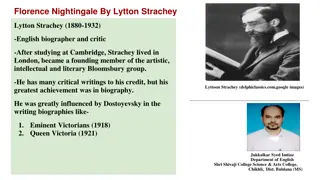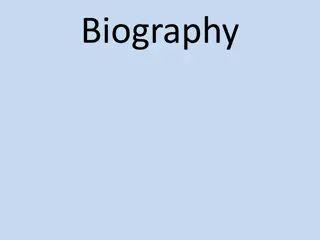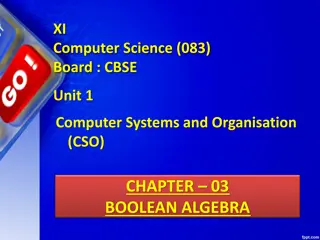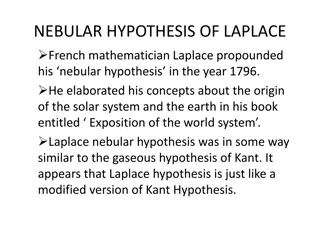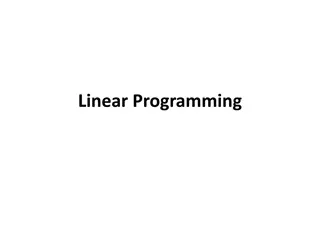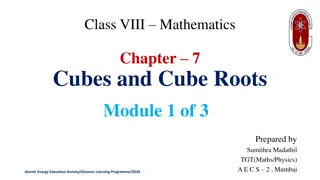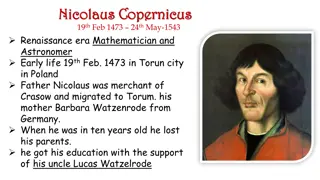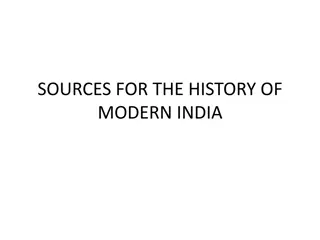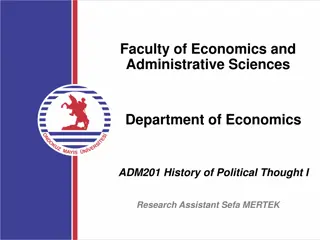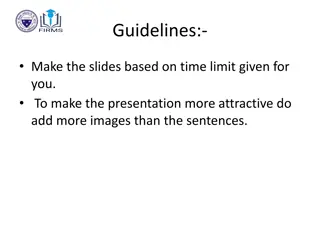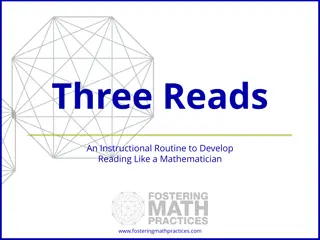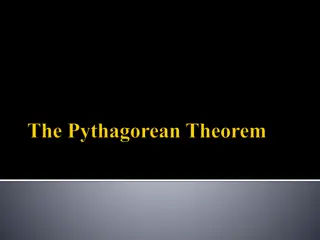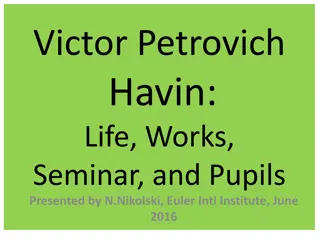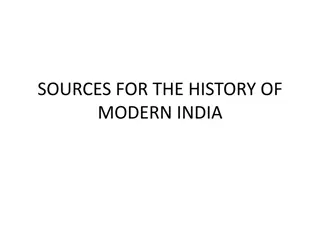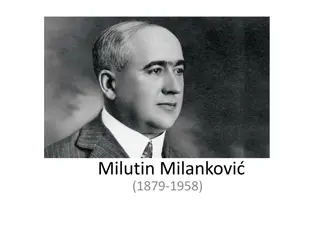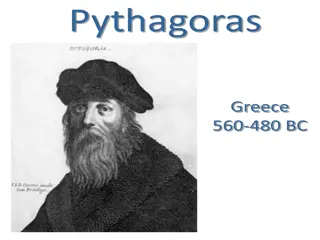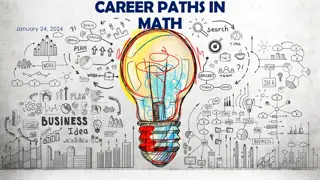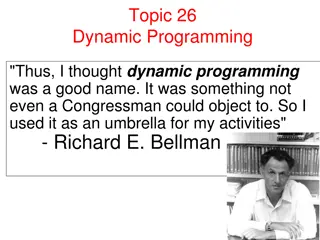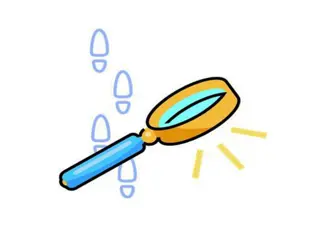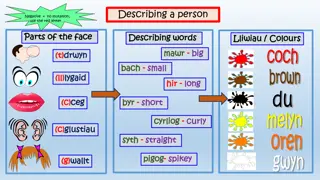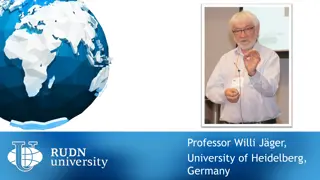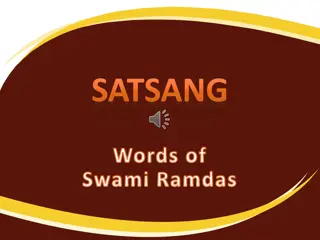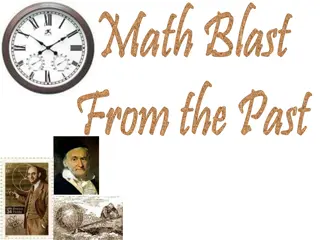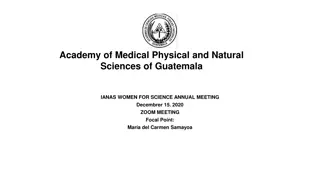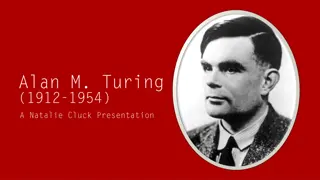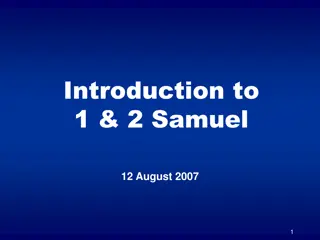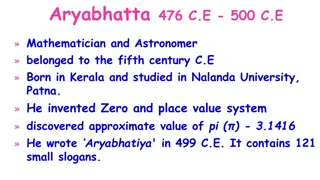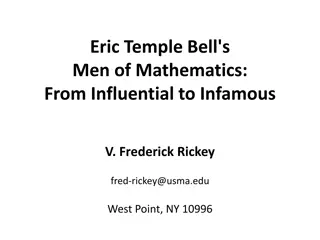Trailblazing Mathematicians and Innovators in Engineering
Irmgard Flügge-Lotz, a German mathematician, made significant contributions to aviation theory and engineering, paving the way for future female engineers. Nina F. Thornhill, a British innovator, focuses on sustainable operation of industrial systems. Both women have received prestigious awards and
0 views • 15 slides
Unraveling the Fibonacci Sequence: Lessons in Mathematics & Nature
Join us on a journey through the enigmatic Fibonacci sequence with engaging lessons on its construction, exploration of mathematical patterns, observations of the golden spiral in nature, and creative activities linking to global goals. Discover the legacy of Fibonacci, the Italian mathematician, an
1 views • 17 slides
Writing an Autobiography - Understanding Auto and Bio
Explore the concept of autobiographies and biographies, understand the prefix "auto," and distinguish between the two genres. Discover the primary sources of information in autobiographies and test your knowledge with a quick quiz. Engage with famous faces like Anne Frank and Jessica Ennis to identi
0 views • 10 slides
Biography of Florence Nightingale by Lytton Strachey: Unveiling the Truth Behind the Popular Conception
Florence Nightingale, a prominent English social reformer and statistician, was not merely the saintly figure portrayed in popular imagination. This article delves into her family background in Derbyshire, highlighting her affluent upbringing and the societal expectations she defied by choosing a di
0 views • 15 slides
Understanding Biographies: Facts and Features
A biography is a detailed account of a person's life written by an author who has researched the subject extensively. It typically includes information about the individual's birth, childhood, significant life events, achievements, and, if deceased, details of their death. Biographies are written in
0 views • 13 slides
Understanding Boolean Algebra in Computer Science
Boolean algebra, developed by mathematician George Boole, is essential in computer systems for performing logical operations with True and False values represented as 1 and 0. It involves operators like AND, OR, and NOT, enabling digital computers to process information effectively. Truth tables aid
0 views • 52 slides
Laplace's Nebular Hypothesis: Origin of the Solar System
French mathematician Laplace proposed the nebular hypothesis in 1796, refining Kant's gaseous hypothesis. Laplace asserted a hot rotating gaseous nebula cooled gradually, contracting and increasing rotation speed. Eventually, centrifugal forces led to the formation of ring structures, contrasting wi
0 views • 6 slides
Understanding Linear Programming: An Introduction to Optimization
Linear programming, introduced by mathematician George B. Dantzig in 1947, is a mathematical technique for optimizing resource allocation in a systematic manner. It involves formulating linear relationships among variables to achieve desired results like cost minimization or profit maximization. Lin
1 views • 60 slides
Exploring Cubes and Cube Roots with Srinivasa Ramanujan
Delve into the fascinating world of cubes and cube roots through an engaging story featuring the legendary mathematician Srinivasa Ramanujan and G.H. Hardy. Learn about the concept of Hardy Ramanujan Number 1729 and discover the properties of cubes in geometry. Uncover the connection between numbers
1 views • 21 slides
Nicolaus Copernicus: Renaissance Astronomer and Mathematician
Nicolaus Copernicus, born on 19th Feb 1473 in Torun, Poland, was a key figure in the Renaissance era. He proposed the revolutionary Heliocentric Theory and argued that the planets revolved around the Sun. His major work, "On the Revolutions of Heavenly Spheres," challenged the geocentric view of the
0 views • 23 slides
Sources for Understanding Modern India's History
Plenty of information on political, social, economic, and cultural developments in Modern India can be found through literary sources like printed books, government documents, newspapers, magazines, pamphlets, historical buildings, biographies, and memoirs. These sources shed light on various aspect
0 views • 9 slides
The Life and Contributions of Plato: A Historical Overview
Plato, a Classical Greek philosopher and mathematician, played a significant role in shaping Western philosophy and science. Born around 427 B.C. in Athens, he was influenced by his mentor Socrates and later founded the Academy in Athens. Plato's works such as "The Republic" and "The Laws" are renow
0 views • 45 slides
Innovations in Artificial Intelligence Research - ICAIR 2021
Discover the latest advancements in Artificial Intelligence research presented at ICAIR 2021. Explore insightful research articles, abstracts, descriptions, conclusions, and biographies, all encapsulated in this cutting-edge conference.
0 views • 8 slides
Develop Math-like Reading Skills with Three Reads Instructional Routine
Explore the Three Reads instructional routine designed to help develop reading skills like a mathematician. Learn to pay attention to important quantities, create mental images, identify crucial information, and state questions in your own words for better problem-solving in math. Improve your abili
0 views • 8 slides
Exploring My Favorite Singers: Lady Gaga and INNA
Discover the captivating journey of American singer Lady Gaga, known for her unique style and exciting songs, as well as Romanian singer INNA, with her pop-rock flair. Explore their biographies, careers, styles, and why they are adored by many around the world.
4 views • 7 slides
Exploring the Pythagorean Theorem and Its Origins
The Pythagorean Theorem, named after the ancient Greek mathematician Pythagoras, is a fundamental principle in geometry relating to right triangles. While Pythagoras is credited with offering a proof of the theorem, evidence suggests that earlier civilizations like the Babylonians and ancient Chines
0 views • 21 slides
Understanding the Pythagorean Theorem: History, Application, and Baseball Problem
Pythagoras, a renowned mathematician from ancient times, formulated the Pythagorean Theorem to calculate the lengths of sides in right triangles. This theorem has significant implications in various fields, aiding in distance computation, navigation, and ramp design. Moreover, its practical applicat
0 views • 14 slides
Victor Petrovich Havin: Life and Works Seminar Overview
Victor Petrovich Havin, a renowned mathematician, was born in 1933 in St. Petersburg. Despite facing challenges during World War II and the Soviet regime, he pursued his passion for mathematics and became a Professor at St. Petersburg University. His career included significant events such as Stalin
0 views • 31 slides
René Descartes: Philosopher and Mathematician Extraordinaire
René Descartes, known as the Father of Modern Philosophy, made significant contributions to both philosophy and mathematics. Born in 1596 in France, Descartes received a Jesuit education and later worked as a Corps of Engineers applying mathematics to practical applications. His philosophical works
0 views • 15 slides
Understanding the Sources for the History of Modern India
The sources for the history of modern India encompass literary sources such as printed books, government documents, newspapers, magazines, pamphlets, historical buildings, biographies, and memoirs. These sources provide insights into the political, social, economical, and cultural developments in In
0 views • 9 slides
The Life and Achievements of Milutin Milanković
Milutin Milanković, born in 1879 in the Austro-Hungarian Empire (now Croatia), overcame childhood challenges to become a prominent civil engineer and mathematician. He excelled in education, practiced engineering in Vienna, and later focused on fundamental research. Milanković's contributions to r
0 views • 16 slides
Pythagoras: The First True Mathematician from Greece
Pythagoras, born in 560-480 BC in Greece, is often regarded as the first true mathematician. He founded the Pythagoreans, who believed in the concept that "All is Number," emphasizing the importance of numbers in the universe. Pythagoras is renowned for the Pythagorean theorem and his work in geomet
0 views • 12 slides
Understanding Recount Text Structures and Features
Recount text is used to retell events in chronological order and describe what happened. It can include various text types like letters, diaries, newspaper articles, biographies, and more. Different structures such as factual recount, historical recount, and personal recount provide a framework for
0 views • 17 slides
Understanding Jeans-Jeffreys Tidal Theory of Planet Formation
Tidal Theory posits that planets form from condensed materials close to the sun, a concept pioneered by Sir James H. Jeans and Sir Harold Jeffreys. Jeans proposed continuous matter creation in the universe, while Jeffreys explored the solar system's origin and latitude variation through astronomical
0 views • 5 slides
Career Paths in Mathematics: A Comprehensive Overview
Explore various career paths in mathematics including roles such as accountant, actuary, auditor, data analyst, economist, mathematician, statistician, and teacher. Each profession utilizes mathematical skills in unique ways, from financial calculations to risk management and data analysis. Discover
0 views • 14 slides
Isaac Newton: Contributions to Mathematics and Physics
Isaac Newton, a renowned physicist and mathematician from England, was the greatest scientist of his era. Despite being described as 'idle' and 'inattentive' in school, he formulated the Three Laws of Motion and the law of Universal Gravitation. Newton's mathematical contributions include studying p
0 views • 16 slides
Understanding Dynamic Programming through Richard Bellman's Insights
Dynamic Programming, as coined by mathematician Richard Bellman in the 1950s, is a powerful method for solving complex problems by breaking them into smaller sub-problems. Bellman's innovative approach has had a significant impact on various fields. This article explores the origins, principles, and
0 views • 38 slides
Exploring Found Poetry with Primary Sources
Discover the art of found poetry by selecting words of theme, essence, and significance from primary sources such as historical documents or biographies. Transforming existing text into poetry creates new meaning and expression. Utilize Library of Congress resources and teaching guides to engage in
0 views • 14 slides
Enhancing Writing Skills at Escrick C of E Primary School
At Escrick C of E Primary School, the approach to English education focuses on core skills like phonics, reading, writing, and letter formation. The curriculum incorporates a variety of text types and genres, including persuasive writing, biographies, fiction, and poetry. Writing activities are embe
0 views • 10 slides
Effective Strategies for Developing K-12 Standards
Veteran mathematician Larry Gray shares his successful experience in creating impactful K-12 math standards, emphasizing the importance of quality ingredients, expert preparation, and thorough collaboration. The process involves forming committees with diverse expertise and stakeholder involvement t
0 views • 28 slides
Welsh Female Singers: Descriptions and Biographies
Explore descriptions and biographies of Welsh female singers like Kizzy Crawford and Elin Fflur. Learn about their appearances and backgrounds, and discover their music through this engaging task.
0 views • 6 slides
Professor Willi Jäger - Mathematics in Understanding and Controlling COVID-19
Professor Willi Jäger from the University of Heidelberg, Germany, is a renowned mathematician with a special focus on nonlinear systems, PDEs, and mathematical modeling. He has received numerous prestigious scientific awards and has made significant contributions to various fields of interest. Join
0 views • 5 slides
The Importance of Satsang on the Path of Spiritual Growth
Satsang, meaning the contact of Truth or God, is considered the first step towards God-realization according to Swami Ramdas. It involves being in the company of saints or engaging in activities related to God with devotees. Satsang helps in clearing doubts, providing encouragement, and freeing ones
0 views • 7 slides
Understanding Markov Chains and Applications
Markov chains are models used to describe the transition between states in a process, where the future state depends only on the current state. The concept was pioneered by Russian mathematician Andrey Markov and has applications in various fields such as weather forecasting, finance, and biology. T
1 views • 17 slides
The Remarkable Life and Legacy of Mathematician Carl Friedrich Gauss
Carl Friedrich Gauss was a prodigy who made significant contributions to mathematics at a very young age. He famously solved the problem of adding numbers from 1 to 100 quickly by recognizing a pattern. Despite personal tragedies, including the loss of his first wife and child, Gauss continued to ex
0 views • 15 slides
Women for Science Annual Meeting by Academy of Medical Sciences Guatemala
The Academy of Medical Physical and Natural Sciences of Guatemala holds its annual Women for Science meeting virtually in light of the COVID-19 pandemic. New members, including women, are welcomed, and initiatives such as a biographies project and cooperation agreements with women's organizations ar
0 views • 4 slides
Alan Turing: Mathematician, Cryptanalyst, and Computer Science Pioneer
Alan Turing, an English mathematician, cryptanalyst, logician, philosopher, and pioneer in computer science, played a crucial role in deciphering German Enigma encrypted messages during World War II. He is known for his work on the Turing machine, considered the foundation of theoretical computer sc
0 views • 6 slides
Insights into the Books of Samuel: History, Authorship, and Significance
The Books of 1 & 2 Samuel were originally one book in Hebrew, later split in the Greek Septuagint. They reveal the lives of key figures like Samuel, Saul, and David, providing spiritual biographies and historical links from judges to the monarchy. These books also introduce significant concepts like
0 views • 31 slides
Aryabhatta (476 C.E. - 500 C.E.): Mathematician and Astronomer
Aryabhatta, a mathematician and astronomer from the fifth century C.E., hailed from Kerala and studied at Nalanda University. He made groundbreaking discoveries such as the invention of zero, the place value system, and an approximate value of pi. His work "Aryabhatiya" delves into astronomy, arithm
0 views • 5 slides
Eric Temple Bell: Mathematician Extraordinaire and Prolific Author
Eric Temple Bell, a renowned mathematician and author, led an illustrious career in academia. With a strong educational background and extensive research contributions, Bell made significant advancements in arithmetical functions, Diophantine analysis, and more. Throughout his teaching career and be
0 views • 32 slides
